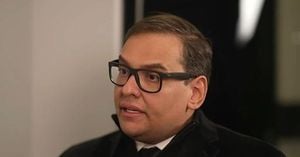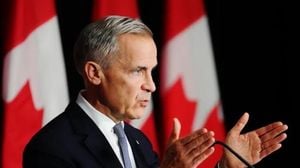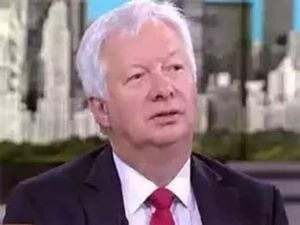The leadership race for the Liberal Party of Canada is heating up as the deadline for candidates has now passed, leaving Mark Carney and Chrystia Freeland at the forefront, striving to succeed Justin Trudeau as leader and potential Prime Minister. Recently, Industry Minister François-Philippe Champagne publicly endorsed Carney, proclaiming they share the same economic vision, reflecting the growing unity among cabinet members around Carney’s candidacy.
During a media gathering on January 26, 2025, Carney, currently enjoying the backing of multiple cabinet ministers, confirmed his commitment to running as a Liberal candidate in the next election, regardless of the outcome of the leadership race. He expressed gratitude for the support he received, particularly from Champagne, and reassured concerned Liberal party supporters about the direction of the party. "Together, we can navigate these challenging waters," he stated emphatically.
Seven candidates have officially entered the race, submitting paperwork along with the required $50,000 deposit last week. Alongside Carney and Freeland, the list includes MPs Karina Gould, Jaime Battiste, Chandra Arya, and former MPs Ruby Dhalla and Frank Baylis. The new Liberal leader will be selected on March 9, 2025, binding the future of the party and potentially shaping Canada’s political course.
Freeland’s candidacy has attracted considerable attention, claiming to represent the grassroots movement within the party. Recently, she called for transparency and has maintained the need to challenge the “Ottawa establishment.” This framing is central to her campaign philosophy, asserting, "It's central to my campaign to see this is not about Liberal elites deciding. This is about the grassroots."
On the other hand, Carney has steadily gained endorsements since announcing his candidacy. Notably, Transport Minister Anita Anand, Defence Minister Bill Blair, and Housing Minister Nathaniel Erskine-Smith lent their support this past Saturday. Anand, through social media, articulated her belief, stating, "We agree Mark Carney is the leader Canada needs," citing the global financial crisis of 2008 as her first substantial experience working with him, highlighting his capabilities during tumultuous economic times.
Further emphasizing the weight of his experience, Blair remarked on social media, "He has experience and proven track record...navigation through tough economic situations is what we require now more than ever."
Even as candidates strive for prominence, there’s an evident divide being analyzed by commentators and insiders from political circles. The panel of Inside Winnipeg Politics discussed these developments, asking if the candidates provide substantial policy shifts or merely perpetuate the existing framework. With many controversies arising during the past leadership, unity remains the primary theme dominating discussions on the future of the party.
"It’s time for the Liberal party to prove it remains relevant during times when urban Canadian sentiment sways," they remarked. The candidates are addressing pitched topics like housing affordability, healthcare reforms, and public trust concerning Liberal handling of government responsibilities.
The race is not simply about choosing the next leader, as the repercussions will greatly affect the party’s ability to reshape its narrative when preparing for impending elections. The candidates represent differing narratives: Freeland as the face of grassroots activism and Carney embodying seasoned leadership capable of managing crises.
Erskine-Smith voiced support for Carney, asserting, "We need seriousness and we need thoughtfulness," pinpointing the importance of selecting someone equipped with political acumen who understands sustainability and crises management. Each of the candidates faces scrutiny, reflected when Freeland remarked on the seeming favoritism of Carney among the ogligarchs of power. Yet, evidence supporting such claims remains sparse.
On the eve of the membership confirmation deadline, anxious members are racing to secure their memberships to have their voices heard when it matters most, needing to complete the registration process by 5 PM on January 27.
The next leader carries substantial responsibility, as the Liberal party seeks renewal after Trudeau’s long and impactful leadership tenure. While some analysts suggest Carney's approach might be perceived as more aligned with traditional party lines, others caution more popular support springs from Freeland's relatable approach and grassroots ideology. What shape the party’s future takes largely hinges upon these candidates demonstrating their capacity to represent constituents and fulfill the key promises they have rightfully made.
Whether unifying the party or fortifying the Liberal identity, the race holds significant ramifications not only for the internal dynamics of the party but also on how it may influence policies affecting real Canadian lives.
Overall, the stakes are high: Can the eventual leader navigate this nuanced political atmosphere to not just engage with old problems, but innovate real solutions before Canadians head to the electoral polls?



